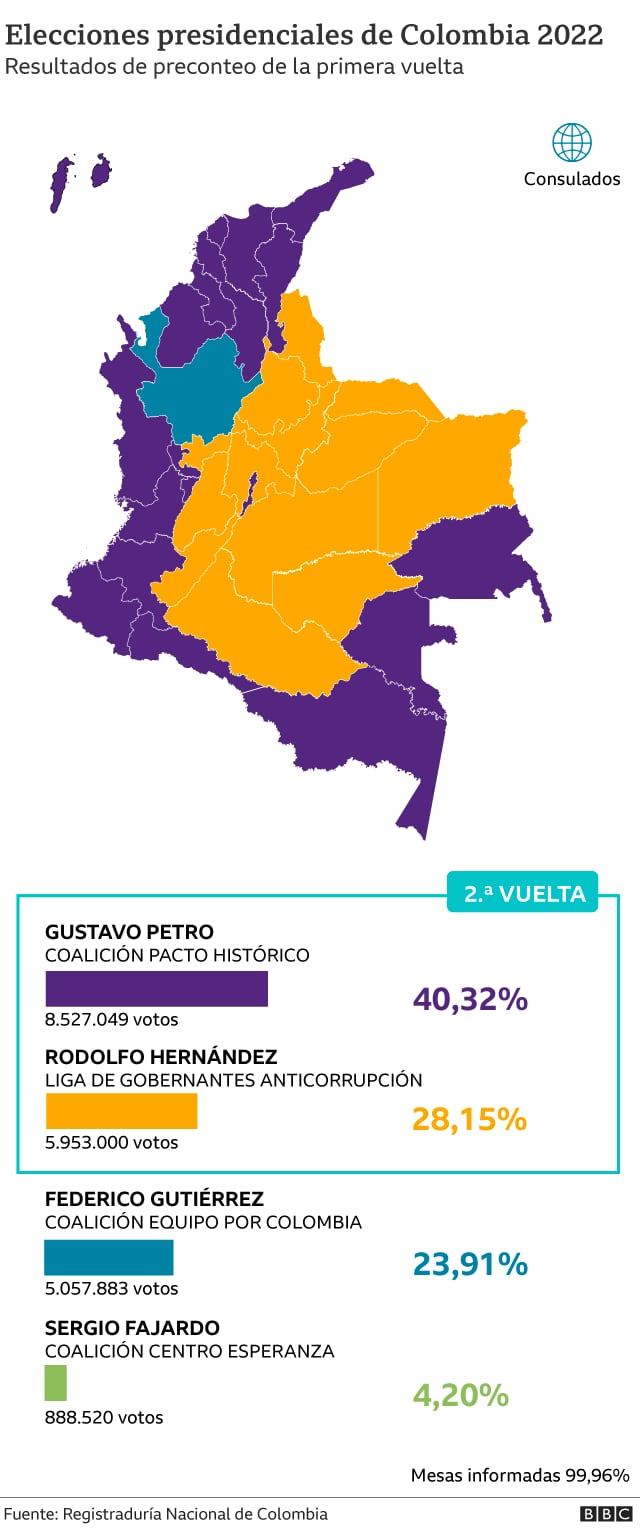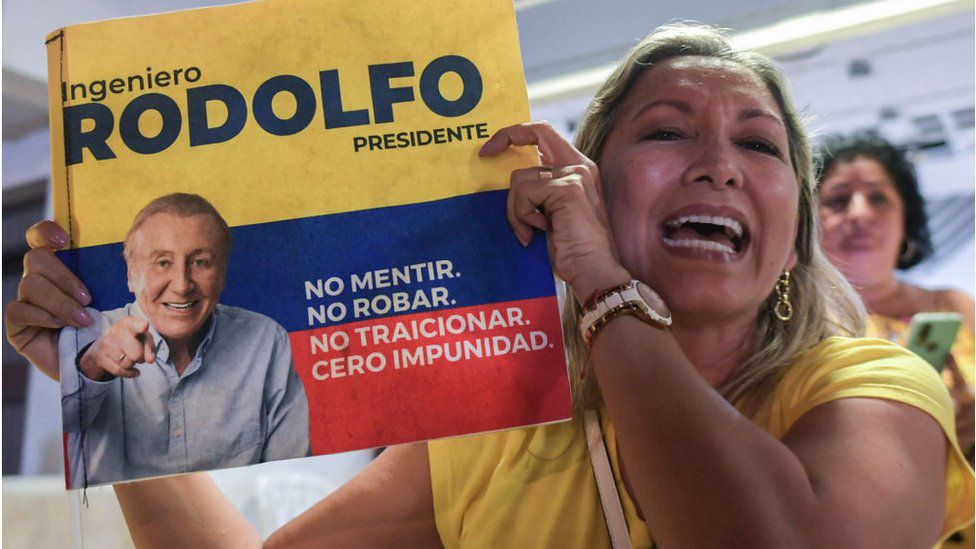The Colombians have kicked the board. Almost two thirds of the people who voted this Sunday did so for a drastic, unprecedented, uncertain change.
The candidates Gustavo Petro Y Rodolfo Hernandez They went to the second round, according to the official pre-count. The appointment for the ballot is June 19.
Look: Petro celebrates his victory and says that Duque’s political project and Uribismo have been defeated in Colombia
This means that the majority in Colombia does not want to “build on what is built”, as was said in campaigns of previous years. They seem tired of euphemisms in a country that hasn’t taken sharp turns for decades.
And it seems that now the turn will be abrupt.
Petro, who achieved 40% of the votes, is a former guerrilla fighter and former mayor of Bogotá who has been on the political spectrum for 20 years as one of the leaders of the opposition to the center-right that ruled the country for decades. Petro is, and above all has been, the anti-system. That’s partly why he generates both support and rejection.
Hernández, who reached the second round with 28% of the votes, went from being a successful social housing builder to being mayor of Bucaramanga, a medium-sized city where he has a reputation for having put public finances in order. His program is uncertain, but his message is clear: fight corruption.
Both candidates represent an agenda of drastic change, but in a different way: Petro is a critic of the system, so much so that he even doubts whether or not there is democracy in the country, while Hernández is a champion against “the politicking of those who believed that they would be government forever”.
Both have advanced to the second round attacking “the usual ones”, who were left out of the presidential race.
But now, faced with this uncertain and unexpected scenario, both candidates will have to modify their speech somewhat to win.
“The second round campaign is going to be very unpredictable, because both are going to have to go against their own discourse,” says Yann Basset, a political scientist and electoral expert.
“Rodolfo will have to reckon with patronage networks, despite his anti-corruption discourse; and Petro will have to show himself as a defender of the institutions,” he explains.
This is what everyone has to do.
Gustavo Petro
This Sunday Gustavo Petro became the first politician from the pure left to win an electoral round in Colombia: with 8.5 million votes, he even surpassed his own record, reached four years ago, when he lost the second round with Ivan Duke (which obtained 10.3 million for the eight of Petro).
The former mayor of Bogotá declared himself victorious after Sunday’s session, because he showed historic electoral strength.
This is the third time he has run for president. His campaign demonstrated experience by having dedicated himself to speeches in the public square and having brought together a wide variety of politicians, many of them opponents or figures that he himself criticized as corrupt.
But that coalition, called the Historical Pact, did not achieve its main objective: to win in the first round. It lacked two million votes. The “change in first”, one of the slogans of the campaign, did not happen. And that could cost them the presidency.
Now Petro will have to achieve at least two things: add all the votes of Sergio Fajardofourth with some 900,000 supports, and to prevent the votes of Federico Gutiérrez, a candidate from the traditional right and the “establishment”, from being transferred automatically to Hernández, who came third with five million (24%).
Experts estimate that Fajardo’s votes can be split, while Gutiérrez’s will go almost directly to Hernández.
“We don’t want to lose the country,” Gutiérrez said in his concession speech this Sunday. “And that is why we will vote for Rodolfo (…) Gustavo Petro is not good for Colombia.”

Although turnout is up a bit from the first round of 2018, 54% of the electorate is still a low voting number. Petro could rally support if he manages to mobilize people who abstain or have difficulty getting to the polls, most of whom are in the vulnerable regions where he usually wins and won.
“Petro will now have to show himself as the possibility of a reasonable change against Hernandez,” says Basset.
Hernandez was a national unknown six months ago. He became famous for controversial comments, unlikely proposals and colloquial speech. That helped him to be close to people.
Petro will have to exploit his role as a scholar who has been building a solid government plan for decades. He can also exploit Hernández’s messages that sounded sexist and radical. And, as he has advanced his campaign, he will seek to add moderate and highly prepared profiles that give confidence in the economic and technical aspects.
Rodolfo Hernandez

The success of Rodolfo Hernández’s campaign was based on two things: the message and the forms.
The first thing was clear: put an end to waste and corruption in the State. The second thing was new: I am as much or more colloquial than people and I communicate through social networks.
Hernández had no problem displaying ignorance on key government issues, swearing in public or bragging about his business success. That helped him enter the second round, but he can prevent him from reaching the presidency.
“He will have to add the support of the entire right, of the patronage networks and the so-called machinery, and that puts him in a delicate situation due to his anti-corruption discourse,” says Basset.
The will for change, the one that manifested itself in the protests and seemed in line with Petro, is also personified in Hernández. But Gutiérrez’s votes, the third this Sunday, reject a drastic change.
Achieving a balance between the rupture that made him popular and the continuity that could lead him to the presidency seems to be Hernández’s challenge. But it is not easy.
“The dispute is going to be concentrated in the areas where Petro did not win with more than 50%,” says Sebastián Londoño, an electoral analyst. “Then, in regions such as the center of the country, where Hernández had a notable performance even though he won Petro, but with less than 50%, it is where the election will be defined.”
Miguel Silva, a political consultant, sees it this way: “Rodolfo took the change speech from Petro, because Rodolfo’s votes seem more anti-system than Petro’s and there is not a vote from Fico (Federico Gutiérrez) that does not go to Rodolfo “.
“It will be a close second lap, but I think the engineer has the advantage.” Silva thinks.
Source: Elcomercio

:quality(75)/cloudfront-us-east-1.images.arcpublishing.com/elcomercio/GIYDAMRNGA2S2MZQKQYDAORSGA.jpg)

:quality(75)/cloudfront-us-east-1.images.arcpublishing.com/elcomercio/DILO5MZHZFHH7GJ6ST2EQJCKBA.jpg)
:quality(75)/cloudfront-us-east-1.images.arcpublishing.com/elcomercio/Z2AK2LPXMZGPHBVGFRPYT6XQPY.jpg)
:quality(75)/cloudfront-us-east-1.images.arcpublishing.com/elcomercio/D6OAAR7IYVAOTO3UPYB4RJMWSQ.jpg)
:quality(75)/cloudfront-us-east-1.images.arcpublishing.com/elcomercio/SO7RGCVHW5DRZLPAKD7AES53HU.png)
